Whistle-Blower Uncovers Cash Sale Of Seminary Land By Cleric

Renowned whistleblower journalist Yashar Soltani has revealed documents indicating that cleric Kazem Sedighi sold the land belonging to a seminary in person, receiving the payment in cash.

Renowned whistleblower journalist Yashar Soltani has revealed documents indicating that cleric Kazem Sedighi sold the land belonging to a seminary in person, receiving the payment in cash.
The documents, made public by Soltani, reveal that on December 10, in a notary office in Niavaran, northern Tehran, Sedighi sold a garden owned by a seminary for approximately 65 billion rials in cash (equivalent to over $100,000).
Sedighi, considered close to Supreme Leader Ali Khamenei, faces allegations of involvement in acquiring a 4,200-square-meter garden in northern Tehran through a family company. The property, estimated to be worth around $20 million, was reportedly transferred from the seminary to the family company, which includes Sedighi and his sons among its members. Other individuals close to Sedighi, such as his daughter-in-law and his security chief, also hold positions within the company established in June 2023.
The disclosure of the new documents contradicts Sedighi's earlier denial of involvement, where he claimed ignorance of the company's establishment and accused a former associate of forgery.
Sedighi's case is not isolated, recent years uncovering allegations of corruption involving other trusted figures, including Parliament Speaker Mohammad-Bagher Ghalibaf and Ayatollah Ahmad Alamolhoda.
Critics demand accountability from the country's supreme leader for those he appoints, emphasizing the need for transparency and integrity within the regime's institutions. Moreover, some within the clergy have expressed concerns over the potential damage to the reputation of clerics as a result of such revelations, already under fire amidst a nationwide uprising sparked in 2022 as Iranians reject the clerical regime.
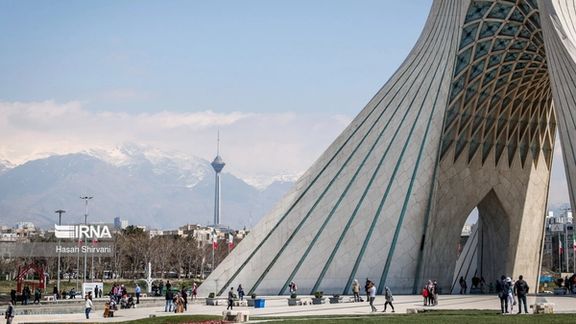
Analysts in Iran are evaluating the country's prospects for recovery and embarking on a path towards development after years of setbacks in domestic and foreign policy, and the economy.
Reza Alijani, a reform-minded religious-nationalist political observer, penned a Persian article for Iran International suggesting that the new Iranian year, beginning on March 20, is poised to be characterized by "chaos and disillusionment in the upper echelons and challenge and erosion in the lower depths" of Iranian society.
Alijani asserts that with the increasing empowerment of radical forces, the social sphere is unlikely to open up; instead, more restrictions may be imposed to suppress militant women opposing the compulsory hijab rule.
Moreover, the ongoing battle between dissatisfied youths and the rigid minority opposing modern lifestyles is expected to persist. Alijani suggests that beneath the surface, public dissent simmers, poised to erupt fueled by frustration over declining livelihoods and resentment toward the lifestyle promoted by hardliners.
Within the government, as the new parliament convenes in the summer, internal strife is expected to intensify. This year, preparations for the upcoming presidential election in 2025 will also commence, further fueling chaos and infighting among the upper echelons of power.
Simultaneously, a complex chess game will unfold among clerics and politicians, shaping the landscape for succession and the post-Khamenei era of the Islamic Republic.
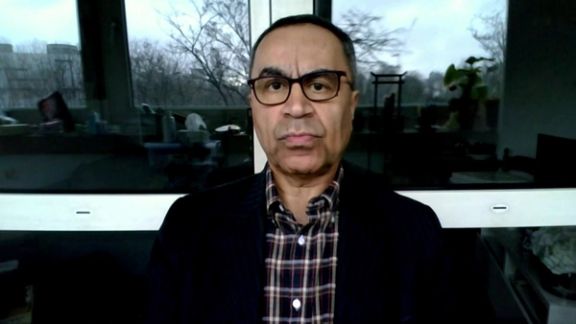
Additionally, Alijani predicts that foreign-based opposition groups will become more radical, while there may also be opportunities for moderates to emerge. This could pave the way for the establishment of an efficient democracy after a transitional period.
Reformist commentator Abbas Abdi characterized the new year as the last opportunity for the regime to come to its senses and begin a process to bring the country to cohesion and progress. The new year, he wrote in Tehran’s Etemad newspaper, marks the need for the government to wake up and accept to bring about or surrender to changes in domestic and foreign policies, as well as in the economy.
In his commentary headlined as "Year of reforms, Year of Awakening," Abdi wrote that "last year was the end of dreams and wishful thinking and the new year is an opportunity for awakening and change.” He added that although the current wishful thinking in the government based on illusions was once tried under the Ahmadinejad administration in the2010s, toward the end of that period even hardliners looked forward to its end.
The new wave of ultraconservatism which started in 2021 by the coming to power of Ebrahim Raisi as President was marked by a surge in "political purification". It is now evident that this process will never end. The new ultraconservatives refused to take a lesson from the fate of their predecessors, but the latest low-turnout elections in Iran should be proof got them that without changing their ways, everyone can drown in an unpredictable storm.
Abdi expressed the belief that hardliners have now realized that political purification cannot help materialize the unrealistic promises they made at the beginning of their government. Now the people have lost all hope and trust in the government and its promises.
However, knowing the Iranian regime, the idea of an awakening is more out of reach than ever. Describing the grim situation, Massoud Pezeshkian, an MP from Tabriz, told Rouydad24 website: "I have no answers for the people's questions. Every morning they wake up to higher prices. Slightly more than a year is remaining from the lifetime of this government. What has it done for the people so far? Rising prices are breaking the people's back and I have no answer for their questions."
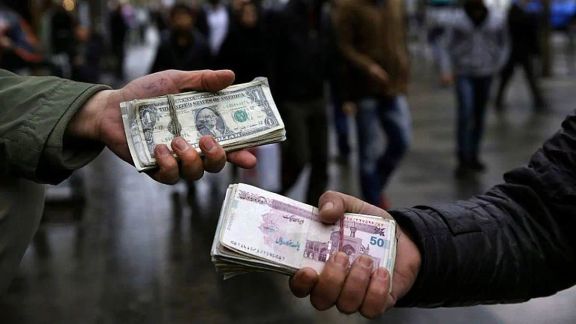
Iran's First Vice President Mohammad Mokhber says the government is committed to addressing the issue of food security amidst the nation's economic challenges.
"One of the main concerns of the government since the removal of preferential exchange rate currency has been focusing on the people's food basket to exert less pressure on them, especially the lower decile of society," he said.
"The government has tried to adequately supply the people's essential food basket," he added.
The official exchange rate of the Iranian rial, subsidized by the state, stands at 285,000 rials per US dollar, significantly lower than the open market rate. The official rate is exclusively utilized for importing essential goods, aiming to shield Iranian consumers from sudden and dramatic price increases due to sanctions.
Mokhber's remarks come in the wake of Iran's currency hitting a historic low of 613,500 rials to the dollar, coinciding with celebrations for the Persian New Year. The sharp depreciation has sparked concerns among citizens, leading many to seek refuge in foreign currencies to safeguard their savings and investments.
However, skepticism persists among Iranians regarding the government's mishandling of economic policies. Masoud Pezeshkian, a parliamentarian, criticized the failure to fulfill promises of curbing inflation, which continues to plague the populace.
"It was planned for inflation to first halve and then become single-digit, but not only did it not halve, it has increased several hundred times." He added, "People are living with difficulty, and we have not acted on the slogans we raised about justice."
Iran's economy has grappled with persistent inflation exacerbated by international sanctions and domestic economic mismanagement. Sanctions have constrained Iran's access to global markets, leading to shortages of essential goods and currency devaluation.

The serious corruption allegations against Ayatollah Kazem Sedighi, the ultra-hardliner Friday imam of Tehran, have further eroded trust in the Iranian system and its officials among the populace.
Earlier this month, irrefutable evidence surfaced indicating Sedighi's involvement in the appropriation of a valuable plot of land worth approximately $20 million in northern Tehran. The revelation, brought forth by a whistle-blower, shed light on Sedighi's alleged misdeeds.
Initially, Sedighi denied any knowledge of the transfer of ownership, claiming his signature had been forged by a trustee. However, it was later revealed that Sedighi had personally signed the transfer documents at a notary public. Despite this acknowledgment, the seminary he oversees maintained innocence and stated that the plot's ownership was in the process of being returned.
“Claiming [the plot] is in the process of being repatriated [to the seminary], several months after the crime was committed and following its revelation, has no effect on the [nature of the] crime itself,” Mohsen Borhani, a dissident lawyer with seminary training, said on Instagram, arguing that repatriation of the plot, if completed, can only be a factor contributing to reduction of the prescribed sentence for the crime.
Iran International TV’s “Your Side of the Story” program received dozens of messages last week from citizens who are extremely distrustful of a regime they say is “systematically corrupt” and incorrigible.
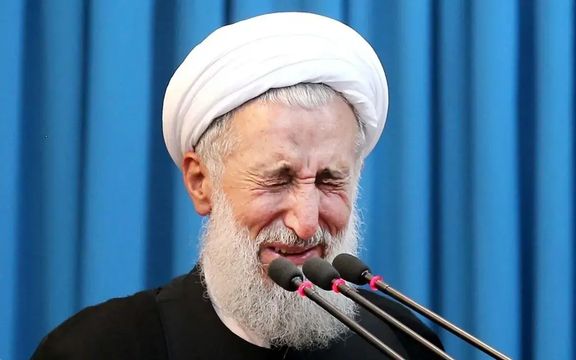
Some of the messages shared the same suspicions that repatriation of the appropriated plot to the Seminary by Sedighi, even if true, meant nothing other than “taking from one pocket and shoving it in the other”.
Many others who have taken to social media to express their anger, compare authorities’ leniency in dealing with Sedighi’s “grand theft” with their extreme harshness against others for petty theft.
People commented that the system punishes petty criminals for theft by long prison sentences and even amputation of fingers and hands, targets women for showing a few strands of hair, but has not taken any action against Sedighi as if repatriation of the ownership of the plot to the seminary all wrongdoing is forgiven.
“Firstly, there is no documentation or evidence that this man repatriated the plot. Even if he produces proof, no one will believe it because Iranian people’s trust in the authorities of the Islamic Republic does not even reach one percent,” one of the messages sent to Your Side of the Story read.
A veteran of the Iran-Iraq War (1980-1988), Khalil Aghapour, in a tweet recounted how as a 15-year-old he had forged his father’s signature to be able to join the volunteers to defend the homeland against the Iraqi invasion, and was mortally wounded several times. “I wish I was dead,” he said, referring to the deeds of those in power who he said claim to be pious.
Sedighi is among Supreme Leader Ali Khamenei’s inner circle. Despite the scandal involving him, he was invited to Khamenei’s Norouz (New Iranian Year) speech on March 20.
Hardline media such as Tehran Municipality’s Hamshahri newspaper and Fars News Agency, have been sympathetic to Sedighi and tried to justify his actions.
Dedicating a large section on its front page to the issue on Saturday, Hamshahri called on hardline students known as Justice Seekers (Edalatkhahan) who are highly critical of Sedighi to treat the case “piously” and to “avoid gross injustice in the name of seeking justice”.
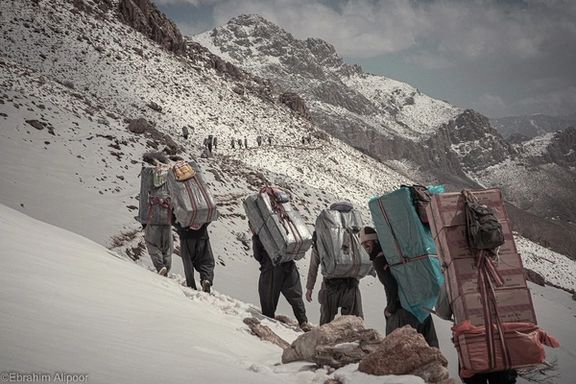
In the last Iranian year, 44 kolbars have lost their lives with 400 more sustained serious injuries as they work on the Iran-Iraq border, a 90 percent year on year rise.
The Kurdish workers are used to transport goods across the mountainous border, most of whom live below the poverty line, in the direct line of fire on the treacherous border zone.
The Kolbars regularly face direct shootings by Iran's military forces, landmine explosions, harsh weather conditions, fatal falls from heights, and drowning incidents.
Of the injured kolbars, 337 suffered wounds from direct shootings by the military forces of the Islamic Republic, while two were injured by Iraqi military gunfire. Kolbar News reveals that 37 of the victims were under the age of 18, classified as minors.
The statistics center of Kurdpa Human Rights Organization documented that from 2012 to 2023, at least 2,206 kolbars were either killed or injured. Out of those, 589 lost their lives, and 1,617 sustained injuries.
Kolbar News last year reported that in the first half of 2023 alone, 61 Kolbars lost their lives in border areas and inter-road routes of West Azarbaijan, Kordestan, and Kermanshah provinces.
Human rights organizations, along with some members of parliament, have consistently emphasized that Kurdish citizens in the western regions of Iran resort to the job as a means of survival amidst rampant poverty.
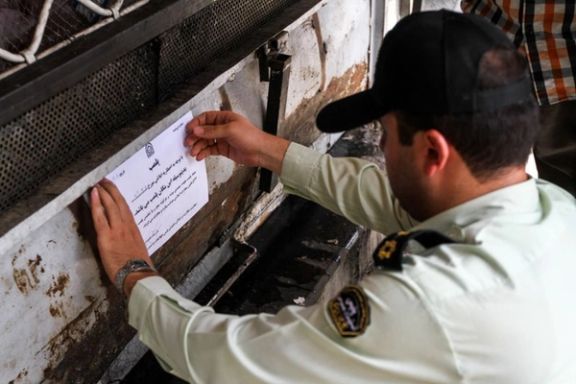
Authorities of the Islamic Republic have sealed over a hundred shops across various cities including after being accused of disrespecting the month of Ramadan.
Iranians are required to refrain from eating, drinking, and smoking in public during Ramadan, even if inside their vehicles. Article 638 of Iran's Islamic Penal Code, implemented about 12 years after the 1979 Islamic Revolution, mandates penalties ranging from 10 to 60 days imprisonment or up to 74 lashes for violating fasting regulations, applicable to all regardless of religion.
The Prosecutor of Hamedan, Hassan Khanjani, announced the sealing of 65 businesses along with a food court for “non-compliance with Ramadan regulations” on Saturday.
In a similar vein, the police commander of Rey said that "24 defiant businesses and violators of the Ramadan regulations have been sealed off as part of the supervision plan on establishments during Ramadan." Additionally, he added that 73 other businesses have been warned of closure.
The crackdown follows Iranian media reports in mid-March detailing the sealing of four restaurants in Abhar, Zanjan province, and 10 businesses in Dezful, Khuzestan province, forfailing to observe strict Ramadan mandatory regulations.
Officials of the Islamic Republic issue warnings annually during Ramadan, emphasizing the importance of fasting. On March 20, Deputy Interior Minister for SecurityAffairsMajid Mirahmadi cautioned against "public fast-breaking" by Norouz travelers, citing Article 638 of the Islamic Penal Code, which deems eating in public a punishable offense.
Mirahmadi reiterated the prohibition on operating businesses such as restaurants, cafes, teahouses, and food vendors within cities before sunset.